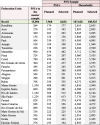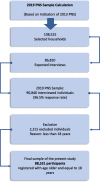Depression and associated factors among Brazilian adults: the 2019 national healthcare population-based study
- PMID: 37770824
- PMCID: PMC10537974
- DOI: 10.1186/s12888-023-05133-9
Depression and associated factors among Brazilian adults: the 2019 national healthcare population-based study
Abstract
Background: Mental disorders represent a major public health challenge worldwide, affecting 80% of people living in low- and middle-income countries. Depression, a mental disorder, is a chronic disease of long duration that causes changes in the brain, resulting from a combination of genetic, physiologic, environmental, and behavioral factors. The aim of this study was to investigate possible factors associated with depression in Brazilian adults.
Methods: A population-based, cross-sectional study was carried out using the public domain database of the 2019 National Health Survey, conducted in Brazil. Depression was considered the dependent variable, and through hierarchical analysis, predictor variables were investigated such as, at the distal level-socioeconomic variables, at the intermediate level-variables related to lifestyle behavior, health condition, and history, and at the proximal level-demographic variables. Logistic regression analysis was used to obtain the adjusted Odds Ratio and the respective 95% confidence interval to identify possible factors associated with depression.
Results: The study included 88,531 participant records with 10.27% diagnosed with depression. The adjusted association measurements, after selecting the independent variables in the hierarchical analysis, showed the following factors associated with depression with differing magnitudes: age, brown and white race/skin color, female sex, poor, very poor, or regular self-reported health condition, diagnosis of cardiovascular disease, work-related musculoskeletal disorder, history of smoking habit, and macroeconomic region.
Conclusions: An effective strategy for preventing and managing depression in Brazilian adults must include the control of health status and lifestyle behavior factors, with actions and programs to reduce people's exposure to these factors, understanding that socioeconomic-demographic differences of each population can potentially reduce the disease burden.
Keywords: Associated factors; Depression; Depressive disorder; Mental disorders; Public health.
© 2023. BioMed Central Ltd., part of Springer Nature.
Conflict of interest statement
The authors declare no competing interests.
Figures


Similar articles
-
Prevalence and correlates of depressive symptoms among adults living in the Amazon, Brazil: A population-based study.J Affect Disord. 2017 Nov;222:162-168. doi: 10.1016/j.jad.2017.06.053. Epub 2017 Jul 5. J Affect Disord. 2017. PMID: 28709023
-
Contextual and individual inequalities of multimorbidity in Brazilian adults: a cross-sectional national-based study.BMJ Open. 2017 Jun 9;7(6):e015885. doi: 10.1136/bmjopen-2017-015885. BMJ Open. 2017. PMID: 28601836 Free PMC article.
-
Prevalence of Depression and Depression Care for Populations Registered in Primary Care in Two Remote Cities in the Brazilian Amazon.PLoS One. 2016 Mar 1;11(3):e0150046. doi: 10.1371/journal.pone.0150046. eCollection 2016. PLoS One. 2016. PMID: 26930353 Free PMC article.
-
Prevalence of self-reported lifetime medical diagnosis of depression in Brazil: analysis of data from the 2019 Brazilian National Health Survey.BMJ Open. 2022 Dec 5;12(12):e063902. doi: 10.1136/bmjopen-2022-063902. BMJ Open. 2022. PMID: 36576186 Free PMC article.
-
Healthcare use and prescription of opioids in rural residents with pain.Rural Remote Health. 2014;14(3):2879. Epub 2014 Sep 9. Rural Remote Health. 2014. PMID: 25204693
Cited by
-
Prescribing Patterns and Pharmacotherapeutic Risk Among Community-Dwelling Older Adults in Brazil: A Cross-Sectional Study.Cureus. 2025 Jun 16;17(6):e86139. doi: 10.7759/cureus.86139. eCollection 2025 Jun. Cureus. 2025. PMID: 40524848 Free PMC article.
-
Mental Health Outcomes Among Travestis and Transgender Women in Brazil: A Literature Review and a Call to Action for Public Health Policies.Int J Environ Res Public Health. 2025 Jun 20;22(7):977. doi: 10.3390/ijerph22070977. Int J Environ Res Public Health. 2025. PMID: 40724043 Free PMC article. Review.
References
-
- IHME I of HM and E. Global Health Data Exchange (GHDx). Institute of Health Metrics and Evaluation. 2021. Disponível em: http://ghdx.healthdata.org/gbd-results-tool?params=gbd-api-2019-permalin....Citado 26 de fevereiro de 2022
Publication types
MeSH terms
LinkOut - more resources
Full Text Sources
Medical

